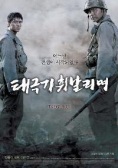Que celui qui n’a jamais vibré à l'écoute d'une musique militaire… 
… me jette la première grenade.
Taegukgi est un film de guerre sympa dans la mesure où l’on peut « aimer » les films de guerre. Ceux qui apprécient Il faut sauver le soldat Ryan et autre Chute du faucon noir seront aux anges tandis que ceux qui préfèrent les approches à la Croix de fer ou Capitaine Conan seront plus mitigés. Encore qu’on puisse aimer un peu tout ça selon le regard qu’on veut bien y jeter. Le spectateur bon public s'fout pas mal du regard oblique des passants honnête et ne boudera pas son plaisir hormonal immédiat devant un gros blockbuster décérébré bourrin. Et s’il laisse le film l’influencer, il sera une nouvelle fois coréen l’espace d’une séance, versant sa petite larme masculine à la fin comme certaines plus féminines le font devant du Meg Ryan. Tout a déjà été très bien dit sur les défauts majeurs du film : abus du pathos, pompage odieux du soldat Ryan, introduction irréelle où tout le monde semble heureux pour mieux flashbacker plus tard, dialogues écrits au tractopelle, BO shootée à l’OPO, j’en passe et des pires mais avouons qu’il n’en comporte pas moins certaines qualités. La relation entre les deux frères est assez bien rendue, les scènes de guerre violentes sont impressionnantes et le discours pas si facho que ça même s’il semble une nouvelle fois prôner un « nord-sud tous ensemble ! » suivi d’un « ... contre les japonais ! » l’espace d’une réflexion pseudo-discrète de soldat déprimé (reprise récemment dans le par ailleurs très sympathique Heaven's Soldiers). Soit on s’en inquiète soit on s’en fout mais ne soyons pas aveugles pour autant : il y a bien « something in the air » et le moins que l’on puisse dire c’est que ça ne sent pas très bon. Cette petite inquiétude à toutefois relativiser en (re)pensant aux US qui nous bassinent depuis des années et des années avec leurs méchants russes et vilains arabes, de ces films honteux qu'on se surprend pourtant parfois à apprécier. Taegukgi est donc "trop", aussi "trop" qu'un Armaggedon ou qu'un Independance Day, certes, mais si vous vous sentez d'humeur à vous engouffrer trois tonnes de cassoulet et à vous complaire dans la facilité éphémère, Taegukgi est ce qu'il vous faut. Car même si l'émotion est l'ennemi premier de la réflexion, n'oublions pas que l'inverse se vérifie également. Pas besoin de confession, je vous absous !
Il faut sauver le Soldat Lee 
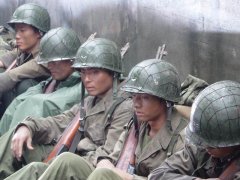 Il faut se rendre à l'évidence, Taegukgi est presque la copie conforme du film américain Saving Private Ryan, en le transposant sur un autre champs de bataille avec un pretexte sensiblement différent. Bon il est vrai que j'éxagère pas mal ; le film doit énormement à l'oeuvre de Spieldberg dans la forme et moins dans le fond. En effet, même s'il s'agit d'un film de guerre, il ne s'agit pas de la même guerre, le contexte en est donc différent et les thèmes qui en ressortent ne peuvent pas être comparés. Mais le style de mise en scène reste dans le meme esprit, cherchant le réalisme jusqu'au bout
Il faut se rendre à l'évidence, Taegukgi est presque la copie conforme du film américain Saving Private Ryan, en le transposant sur un autre champs de bataille avec un pretexte sensiblement différent. Bon il est vrai que j'éxagère pas mal ; le film doit énormement à l'oeuvre de Spieldberg dans la forme et moins dans le fond. En effet, même s'il s'agit d'un film de guerre, il ne s'agit pas de la même guerre, le contexte en est donc différent et les thèmes qui en ressortent ne peuvent pas être comparés. Mais le style de mise en scène reste dans le meme esprit, cherchant le réalisme jusqu'au bout
Pour débuter, on suit une famille à Séoul dans leur train-train quotidien, dont l'ainé des deux fils travaille comme cireur de chaussure pour payer les études de l'autre. Tout se passe correctement, dans la bonne humeur et la fraternité, jusqu'au jour où l'annonce est faite de l'invasion nord coréenne ; et là ça s'accélère : la famille cherche à fuir vers le sud (comme tous les habitants de Séoul) mais les deux frères sont engagés par erreur dans l'armée et sont envoyés au front. Leur périple suit alors les grandes phases de la premiere partie de la guerre de Corée, c'est-à-dire qu'ils font le maximum pour retenir l'invasion nord-coréenne en attendant les renforts américains, puis ils participent à la contre-offensive des alliés contre l'armée communiste, et enfin subissent la vague humaine chinoise. 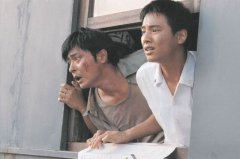 L'histoire ne parle que très peu des deux années qui suivent cette premiere phase, très logiquement car ce n'était au final qu'une guerre de position et une guerre politique. Donc le réalisateur choisit de se concentrer sur le début, et traite bien tous les thèmes important de la guerre de Corée : au cours du film, on voit la cruauté des troupes nord-coréennes face aux populations occupées, puis la cruauté qui finit par s'installer dans les rangs sud-coréens qui n'hésitent pas à abattre froidement leurs prisonniers et finissent par agir pour la gloire plus que pour leur désir de vaincre ; et de l'autre côté on nous montre la façon dont étaient traitées par les sud-coréens les personnes qui avaient signé pour le parti communiste sous la contrainte (ils étaient fusillés ndlr). Ajouter à cela, le scénario entretient assez bien la relation entre les deux frères dont la mentalité change complètement suivant les choix qu'ils font au cours de la guerre ; même si je n'adhère pas vraiment à ce genre d'histoire fraternelle fictive dans un film se voulant réaliste, il faut avouer que cette histoire est bien racontée et donc aisément regardable.
L'histoire ne parle que très peu des deux années qui suivent cette premiere phase, très logiquement car ce n'était au final qu'une guerre de position et une guerre politique. Donc le réalisateur choisit de se concentrer sur le début, et traite bien tous les thèmes important de la guerre de Corée : au cours du film, on voit la cruauté des troupes nord-coréennes face aux populations occupées, puis la cruauté qui finit par s'installer dans les rangs sud-coréens qui n'hésitent pas à abattre froidement leurs prisonniers et finissent par agir pour la gloire plus que pour leur désir de vaincre ; et de l'autre côté on nous montre la façon dont étaient traitées par les sud-coréens les personnes qui avaient signé pour le parti communiste sous la contrainte (ils étaient fusillés ndlr). Ajouter à cela, le scénario entretient assez bien la relation entre les deux frères dont la mentalité change complètement suivant les choix qu'ils font au cours de la guerre ; même si je n'adhère pas vraiment à ce genre d'histoire fraternelle fictive dans un film se voulant réaliste, il faut avouer que cette histoire est bien racontée et donc aisément regardable.
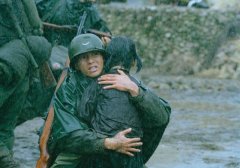 Ainsi, pour mettre en scène tout cela, le réalisateur choisit d'utiliser des ficelles déjà souvent utilisées dans d'autre films de guerre comme Saving Private Ryan (déjà cité plus haut), mais encore Platoon ou encore Windtalkers ; Cela consiste surtout à filmer les tranchées la caméra à l'épaule, qui tremble énormément et donne ainsi une forte impression d'incompréhension entre les explosions d'obus et les tirs ennemis. La caméra file le long de la tranchée en suivant un soldat, en montrant tous les autres tomber sous le feu ennemi, ou bien se promener au milieu du champs de bataille lorsque les deux armées sont au corps-à-corps ou pendant les scènes de guérilla. Lors de l'invasion chinoise, la caméra prend de la hauteur pour montrer le déferlement de la marée humaine qui donne une grosse sensation de vertige et le tout est vraiment très impressionnant. Pour le réalisme, le sang n'est pas oulié ; on peut s'attendre à des bras arrachés et des égorgements de soldats en gros plan, et côté sonore, on se rend bien compte que ce n'est pas des fusillades entre deux gangs de rue.
Ainsi, pour mettre en scène tout cela, le réalisateur choisit d'utiliser des ficelles déjà souvent utilisées dans d'autre films de guerre comme Saving Private Ryan (déjà cité plus haut), mais encore Platoon ou encore Windtalkers ; Cela consiste surtout à filmer les tranchées la caméra à l'épaule, qui tremble énormément et donne ainsi une forte impression d'incompréhension entre les explosions d'obus et les tirs ennemis. La caméra file le long de la tranchée en suivant un soldat, en montrant tous les autres tomber sous le feu ennemi, ou bien se promener au milieu du champs de bataille lorsque les deux armées sont au corps-à-corps ou pendant les scènes de guérilla. Lors de l'invasion chinoise, la caméra prend de la hauteur pour montrer le déferlement de la marée humaine qui donne une grosse sensation de vertige et le tout est vraiment très impressionnant. Pour le réalisme, le sang n'est pas oulié ; on peut s'attendre à des bras arrachés et des égorgements de soldats en gros plan, et côté sonore, on se rend bien compte que ce n'est pas des fusillades entre deux gangs de rue.
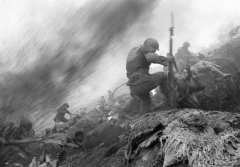 De plus les acteurs sont vraiment très bons ; les deux frères (JANG Dong-Kun et WON Bin) sont impeccables mais on peut noter également les prestations de KONG Hyung Jin en soldat fraternisant (SPOILER un gros cliché en passant : il n'aurait jamais du montrer la photo de sa famille, sa mort imminente en est devenue évidente FIN SPOILER) et LEE Eun-Joo qui a un rôle dramatique difficile. A noter le passage rapide de deux grands acteurs coréen qui assurent leur rôle : CHOI Min-Shik en général nord-coréen très froid et KIM Su-Ro en membre de la ligue anti-communiste très cruel.
De plus les acteurs sont vraiment très bons ; les deux frères (JANG Dong-Kun et WON Bin) sont impeccables mais on peut noter également les prestations de KONG Hyung Jin en soldat fraternisant (SPOILER un gros cliché en passant : il n'aurait jamais du montrer la photo de sa famille, sa mort imminente en est devenue évidente FIN SPOILER) et LEE Eun-Joo qui a un rôle dramatique difficile. A noter le passage rapide de deux grands acteurs coréen qui assurent leur rôle : CHOI Min-Shik en général nord-coréen très froid et KIM Su-Ro en membre de la ligue anti-communiste très cruel.
Techniquement impeccable, le film accroche aussi par ses scènes nouant les tripes et donne de grands frissons dans des scènes dramatiques intenses ; même si de nombreux détails de la guerre sont mis à la trappe, l'histoire est bien racontée et le résultat vaut les moyens mis en oeuvre. Evidemment public sensible s'abstenir.
14 octobre 2004
par
Elise
Mais pourquoi tant de haine ?
Même si Frères de Sang ne parvient pas à renouveler le film de guerre, même s’il s’inspire beaucoup de ce qui a déjà été fait, il ne mérite assurément pas qu’on lui tire dessus à boulets rouges car il possède des arguments indéniables :
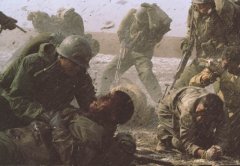 1) La guerre de Corée n’a pas souvent été abordée au Cinéma ces dernières années, et ce thème est traité avec un certain brio notamment à travers de très longues batailles sanglantes et réalistes dans les tranchées
1) La guerre de Corée n’a pas souvent été abordée au Cinéma ces dernières années, et ce thème est traité avec un certain brio notamment à travers de très longues batailles sanglantes et réalistes dans les tranchées
2) Il est toujours intéressant et émouvant d’assister au basculement d’un pays et de ses habitants dans une guerre, de revivre les quelques semaines et quelques jours apparemment sans soucis avant le jour fatidique où l’on vous annonce que les hostilités ont commencé et qu’on vient vous arracher à votre famille, à vos amours et à vos rêves pour défendre votre pays. En cela, la première demi-heure est peut-être la plus touchante
3) Ce film parvient à décrire de manière pertinente l’implosion du socle familial sous le poids d’idéologies antinomiques (capitalisme/communisme) qui s’affrontent, et de fanatiques des 2 bords qui alimentent un conflit qui les dépassent complètement et où ils ne représentent que des pantins. Le manichéisme est d’ailleurs largement évité (ce ne sont pas les méchants cocos contre les gentils sudistes) car toute l’intrigue est centrée sur ces 2 frères ballottés par les évènements, beaucoup plus captivés par la volonté de se sortir réciproquement de ce bourbier infâme que par un patriotisme quelconque, 2 frères évidemment symboles malgré eux d’une guerre civile fratricide qui fait s’entretuer des coréens entre eux (« au moins, quand les japonais étaient là, l’ennemi était clairement défini » dit l’un des soldats…).
Pour ces 3 raisons, il faut voir Frères de sang pour se forger sa propre opinion. C’est loin d’être une révolution en terme de Cinéma, mais son existence est justifiée et permet de rappeler, si besoin en était, à quel point la guerre est absurde et destructrice tant physiquement que psychologiquement.
Du sang et des larmes
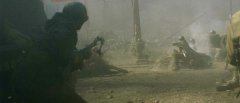
Je me suis senti gêné en voyant le film d'abord parce que le point de vue sur lequel repose le film aurait tout aussi bien pu être celui d'un réalisateur américain ou autre. Bien que le film repose sur l'affrontement historique entre les armées sud et nord-coréennes, il n'est n'est fait qu'une seule fois et de manière fugitive à ce qui a rendu ce conflit si particulier, la schizophrénie d'un peuple se combattant lui-même. A part cette scène dans l'hôpital de campagne qui dure 2 minutes, pas la moindre allusion à cet aspect du conflit. Cela aurait pu être pardonnable si la representation historique avait cédé le pas à l'histoire des deux frères enrolés dans la même unité. Mais en défendant une vision réaliste des batailles, Kang Je-Gyu nous offre un feu d'artifice de chair humaine sans aucune autre explication, comme si tous ces carnages ne servaient que de trame au récit familial.
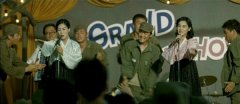
C'est d'autant plus dommage que le récit commençait bien avec l'évocation de la jeunesse des deux héros avant le déclenchement des hostilités, partie certainement la plus réussie du film mais tellement courte par rapport à ce qui va suivre. Après l'enrôlement et le début de la guerre, le récit tient à peu près la route jusqu'à la contre-attaque de l'armée sud-coréenne, ensuite on tombe dans une certaine gratuité des scènes de guerre qui n'apporte pas grand'chose au récit et qui colporte une vision très simpliste des événements. Heureusement que les parties concernant les relations entre les deux frères sont un peu meilleures, notamment grace à
JANG Dong-Kun qui confirme ici son statut d'acteur majeur dans le cinéma coréen. Cela ne suffit quand même pas à sauver le film d'une certaine langueur. Associée à l'aspect démagogique de l'histoire, cela relègue
Taegukgi au rang de nombreux autres films de guerre, ni marquant ni mauvais donc.
22 novembre 2004
par
jeffy
Presque rien à sauver chez le soldat Lee 

Si Taegukgi a surpassé Silmido au Box Office coréen, il l'a en revanche égalé en terme de médiocrité cinématographique. Entendons-nous bien, on n'a rien contre le vol d'idées cinématographiques. A condition qu'il y ait un minimum d'effort de réappropriation. Mais le film s'ouvre comme un Il Faut Sauver le Soldat Ryan mal copié mal digéré avec en bonus un pastiche raté du score du classique spielbergien. Le score va d'ailleurs osciller tout le long du film entre mielleux et pompier. Et le film arrive à bombarder en un temps record une quantité explosive de pathos grossier au service d'un scénario aussi léger qu'une enclume. Les Nord-Coréens n'y dépassent ainsi jamais le statut de brutes sanguinaires et les Chinois celui de horde vociférante. Psychologiquement, c'est du simple, direct et sommaire. Et quand le film tente d'évoquer les conséquences violentes de l'anticommunisme, il fait encore dans le lourd. Quant aux parties guerrières, leur mise en scène se résume à du Soldat Ryan mal copié mal digéré et du Windtalkers mal copié mal digéré. On a même du vol de plans et de situations de ces films-là sans recyclage en option. On retrouve aussi le gros travers de la version salles de la fresque guerrière wooienne: du dialogue répétant 36000 fois la même chose, l'anticommunisme ayant remplacé ici le patriotisme. Sauf que Woo avait l'excuse de ne pas avoir eu les mains libres sur le tournage et qu'il avait rectifié brillamment le tir sur le Director's Cut. On est aussi consterné de voir Choi Min Sik et Jang Dong Kun gâcher leur talent dans un tel projet. Tout juste la direction d'acteurs est-elle la seule chose à sauver dans cet océan de lourdeur et de médiocrité cinématographique. Et Kang Je Gyu n'arrive pas cette fois à sauver le film sur le fil comme il l'avait fait avec un Shiri. Film dont Taegukgi décline la formule (ersatz de blockbuster US de base mâtiné de mélodrame à l'asiatique) de façon encore moins inspirée. S'il permet à l'industrie cinématographique coréenne de se maintenir en bonne santé financière, Taegukgi vient s'ajouter à la liste déjà longue de blockbusters coréens n'apportant strictement rien au cinéma de genre et au cinéma tout court.
Du sacré gros calibre. 
Frères de sang est un film dangereux. Chacun peut avoir une drôle d'opinion face au sujet évoqué, chacun peut y voir un message douloureux sur la bêtise de la violence et des guerres, d'autres se sentiront même clairement mal à l'aise face à cette surenchère inouïe de violence ; c'est pour ça que le film de Je-Gyu est amené à être aimé ou détesté. L'histoire d'une descente aux enfers de deux jeunes frères embarqués de force par l'armée Sud-coréenne pour aller en découdre avec les "rouges" qui tentent d'envahir les contrées. Juste un contrôle de routine qu'ils disaient. Tu parles. Enrôlée de force dès leurs 18 ans, la population locale est alors destinée à être massacrée pour les couleurs du pays. Ils les font combattre pour une idéologie politique et non pas pour la sauvegarde de la Corée. Tout ça n'est qu'une affaire de politiques véreux, avides de pouvoir et de reconnaissance mondiale.
On suit alors les petites aventures d'un régiment de militaires, tous principalement amateurs, dotés chacun d'un charisme bien particulier à défaut d'être très original. A ne pas s'y tromper, Frères de sang est un film qui calque sa structure sur le blockbuster typique hollywoodien avec sa richesse et ses énormes défauts. C'est pas pour rien que la Corée bat actuellement les USA en terme de recettes, car ce petit peuple montant s'américanise de plus en plus face aux conservateurs limite intello du style Kim Ki-Duk. On prend donc le plus gros budget que le pays ai connu, on s'arme de 25 000 figurants pour les scènes de batailles, on bidouille deux trois explosions et gerbes de terre par ordinateur histoire que le spectacle soit aussi gros et too much que leur voisins. Un partit pris spectaculaire, parfois même hallucinant dans la mesure où rarement on aura vu telles batailles, telle violence absolue dans la façon de montrer sans gêne les horreurs de la guerre. Plus d'une fois on verra des types se faire littéralement désintégrer sous nos yeux, exploser par les déflagrations de cocktails et grenades en tout genre, massacrer par bundle, une vision au final désespérée, proche de la complaisance pure et parfaite, mais on mettra cet ensemble sous l'excuse du remède contre la bestialité des hommes plutôt que du spectacle gratuit et infiniment raciste.
Frères de sang culmine tout en haut des meilleurs films de genre, pour ma part bien loin devant le Ryan de Spielby, pour la simple et bonne raison que le message "n'oubliez pas nos héros" particulièrement racoleur chez le cinéaste américain laisse place ici à un récit plus ouvert, presque banal, celui de deux frères qui se séparent physiquement et mentalement au fur et à mesure que la guerre se déroule. L'un est faible et malade, l'autre est fort et bon parleur. Le cliché habituel, mais qu'est-ce qu'on s'en fiche? Tout étant particulièrement fluide, gavé de passages mélodramatiques -certes souvent naïfs- permettant au spectateur un peu éreinté de reprendre son souffle entre 2 batailles particulièrement difficiles. Je-Gyu y va fort certes, mais existe t-il une guerre amusante où l'on y mettrait des grandes roues et des trains fantômes pour rigoler? Tout ceci n'existe que dans l'esprit torturé des géniaux Matt Stone et Trey Parker, mais clairement pas ici, clairement pas dans cette page de l'histoire Coréenne. Les morts tombent par grappe, les civils sont abattus à la chaîne, tout comme les traîtres ou collabos des rouges. Il faut faire avec et assumer cette réalité. Maintenant, à vous d'apprécier ou non cette vision des choses par Je-Gyu, pas de juste milieu. Ca n'empêche pas que son film soit un spectacle tragique digne des plus grands.
Esthétique : 4/5 - Une mise en scène proprement incroyable. Too much mais incroyable. Musique : 4/5 - Des thèmes épiques, drôles et dramatiques. On y trouve son compte. Interprétation : 4.5/5 - Les deux frères sont formidables. Doublage FR en dents de scie. Scénario : -/5 - Une étape dans l'histoire de la Corée. Traité avec plus ou moins de finesse. La violence ferait passer Ryan pour du thé au Ginseng.
Une grande rhétorique stylistique au service d'un discours élaboré 
Vous voulez du gros?
Du bien lourd?
Du très simple?
Votez Taegukgi.
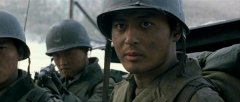
En allant à l'encontre du film, c'est dire en se mettant à réfléchir, on se dit que
Taegukgi est un fasinant objet qui prend exactement le pire du pire cinéma américain mélangé au plus pénible du cinéma coréen. Les seuls éclairs de beauté (le 0.5 de la note) sont dus à la présence de feu Lee Eun-joo, caution féminine d'un machin gonflé de testostérone. On aurait peut être supporté le reste, surtout le côté reconstitution historique du Seoul en débâcle, avec une heure de moins et sans effusion gore ridicules et déplacées. On se demande ce que le public français, qui a rejeté un
Windtalkers moins nullissime (juste nul), va penser de ce machin, et on regrette déjà l'image que cela lui donnera du cinéma coréen.
Il faut sauver le cinéma... 
... mais "Taegukgi", de Kang Je-Gyu, l'enterre.
"Taegukgi" a eu son public, et même pas mal de public à en juger par son score au box-office local. Mais je ne fais résolument pas partie du public que ce film concerne. Je ne pense pas que c'est parceque je ne suis pas coréen. Donc, à la question "soit c'est un film de guerre pas assez universel pour qu'il m'atteigne dans ses enjeux, soit il est cinématographiquement nul", j'ai tranché en moins de deux secondes. C'est parceque ce film est nul.
Maintenant, si je le trouve nul, je ne sais pas si c'est parceque mes références en matière de films de guerre (ou abordant la guerre de quelque manière que ce soit) sont "Apocalypse Now" pour l'Occident et "La condition de l'Homme" pour l'Orient et que fatalement, sur une échelle de 1 à 100, "Taegukgi" montre tellement d'arrachages de membres face à la caméra qu'il n'a jamais pu gravir cette échelle, ou si c'est parceque je suis une élite, ou si les coréens sont des abrutis. Allez savoir.
J'ai lu quelque part, un type qui a écrit quelque chose du genre : "Taegukgi" se rapproche plus d'"Apocalypse Now" que de "Pearl Harbor". Je ne dirais pas que c'est faux, mais tout de même... "Apocalypse Now" est un film totalement démesuré. On fera jamais aussi démesuré, aussi extrême (en prenant en compte les difficultés de tournage, énormes). "Taegukgi" est un film qui joue sur une autre forme de démesure. Celle du "tout montrer", du "toujours plus". L'atteinte d'une forme de "réalisme des situations" dans la façon de filmer la guerre est déjà en soi un pas vers la médiocrité (je ne suis pas anti-Spielbergien pour autant). D'ailleurs, Kang Je-Gyu, j'imagine, s'est mis en tête de faire un film de guerre après avoir vu celui de Spielberg (comme Fukasaku avec "BR 2", du coup ?), mais seulement, je l'imagine aussi en train de se dire un truc du style
"trop cool les scènes de guerre dans "Il faut sauver le soldat Ryan", mais ça dure que pendant les 30 premières minutes et après ça devient chi@!#, bouuh, sniif... [trois minutes plus tard] ...J'ai trouvé une super idée ! Et si je faisais un film de guerre où ça ferait comme dans les 30 premières minutes de "Il faut sauver le soldat Ryan", mais sauf pendant une heure de plus (parceque bon, autour de ça, faut quand même ajouter une histoire d'amitié virile entre deux frères pendant une demi-heure) ? Allez, hop, ça fera sûrement venir plein de monde au cinéma !", et ça, c'est ce qui fout tout en l'air.
J'ai encore regardé "Kagemusha" l'autre jour. Ce que j'ai trouvé admirable dans ce film, entre autres, c'est la bataille, à la fin. On voit l'attaque des différentes forces en présence (les assauts menés par la cavalerie, les salves de tirs, etc...) mais on ne voit pas le massacre dans le cadre. C'est là que le film de Kurosawa fait toute la différence avec une blague comme "Taegukgi" et sa logique du divertissement monstratif. Dans "Kagemusha", on ne voit pas ce qui se passe à ce moment, mais on le sait, on l'imagine (Godard parlait quelque fois d'une "troisième image" apparaissant au spectateur alors qu'elle est invisible, et qui fait l'union entre deux plans coupés par le montage). Et après, lorsque Kurosawa nous montre le champ de bataille, les corps qui tombent lentement sur le score fabuleux de Ikebe Shinichiro, on le sait encore plus, et on atteint cinématographiquement aussi bien qu'émotionnellement quelque chose de très grand.
Bref, je ne continuerai pas d'avantage avec cette comparaison, mais globalement, je reproche à "Taegukgi" sa facilité, ce piège qu'il tend au spectateur crédule. Que Kang Je-Gyu l'ait voulu ou non, "Taegukgi", c'est de la charité filmique. C'est faire l'aumône à un spectateur mendiant.
Et si j'en suis arrivé là, si j'ai craché sur la science du "tout montrer" façon "Taegukgi" (et là je ne m'attaque qu'au côté formel du film, parceque l'amitié entre les deux frères, qu'elle soit sincère ou pas, je n'y accorde pas autant d'importance), c'est parceque c'est vraiment trop gros, c'est vraiment trop de la charité de cinéaste escroc, et que le film est bien trop bardé de ces bourdes (faussement) cinématographiques pour qu'on puisse les passer sous silence.
Amen.
Borderline
Frères de sang
Borderline
3,25 / 5
Pour un ultime film de guerre, Kang Je-Gyu a sorti la grosse artillerie. 25.000 figurants, des tracées de balle retouchées à l'ordinateur et des gigantesques batailles à gogo ne peuvent laisser indifférents. Effectivement, il manque le génie d'un Kubrick ou d'un Malick pour réussir à insuffler la dynamique d'un découpage à l'intérieur de ce qui restera des scènes filmées à l'emporte-pièce, caméra à l'épaule prête à frémir à la moindre explosion à la ronde – mais sans aucun génie.
Kang joue au boucher, autant à l'image en n'épargnant personne (ça charcle à tout-va), que sur son banc de montage, en choisissant parmi les heures de rushes que l'on devine le réalisateur avoir tourné à plusieurs équipes.
Aucune finesse, mais du cinéma à grand spectacle – tout autant que dans son histoire. Extrêmement sommaire, on regrette les multiples pistes à explorer et abandonnées par le réalisateur. Il n'est nullement intéressé par faire du cinéma un grand art; il prend comme référence les blockbusters américains, mais de la belle époque. Plus d'une fois, les déchirements des deux frères trouve des élans épiques proches de celles des superproductions américaines des années cinquante et soixante. Sauf qu'il n'épargne rien, ni personne. Avec la froide cruauté que caractérise le cinéma coréen, pas question de s'attendre à du happy end devant un coucher de soleil flamboyant. La guerre n'épargne personne.
Le conflit Nord/Sud ne sert – là aussi – que de toile de fond au spectaculaire de l'intrigue; et le sujet demeure encore bien trop épineux pour s'engager bien davantage, surtout dans une telle superproduction. Plusieurs fois, Kang esquisse pourtant cette interrogation des deux camps du pourquoi et comment de ce terrible conflit; et il ne présente pas toujours les sudistes sous leur meilleur jour non plus. Des anciens amis (voire FRERES) se retrouvent ainsi dans des camps opposés à s'entretuer jusqu'au moment de se revoir et de prendre conscience de l'absurdité de leur conflit. Une très brève scène voit même les soldats hurler de joie à la rumeur, que les deux pays pourraient être à nouveau réunis. Avant que le spectacle ne reprenne ses droits et que Kang en mette plein les mirettes.
"Gingko Bed" et "Shiri" l'avaient déjà présage, "Taegukgi" ne fait que le confirmer: Kang Je-Gyu est avant tout un artisan – et dans cet art, il est loin d'être mauvais.
PAS MAL MAIS SANS PLUS...
Dès le départ, on sent les influences de SPIELBERG, que ce soit dans la mise en images de certaines scènes ou bien dans l'histoire dans sa globalité. On ajoute à tout cela, de bons moments mélodramatiques et une ENORME dose de patriotisme ( comme la plupart des films coréens) et vous avez FRERES DE SANG. Peut-être un peu longuet mais dans l'ensemble, cela reste correct...
Le début est assez lent et naïf. Le réalisateur insiste trop sur la tristesse et le malheur d’une nation affligée. Ensuite, l’action nous projette au cœur du film. On est pris dans un engrange et on ne peut se défaire de l’intrique du film. Frères de sang est une très belle fresque de la guerre entre les deux Corées. L’acteur Jang Dong-Kun est fidèle à lui-même, c’est-à-dire parfait. Ce rôle de frère responsable et un peu tête brûlée lui va à ravir. Point regrettable, encore une fois, c’est le doublage de la version française où ils ont pris les personnes les plus molles qu’ils puissent exister. Doc Gyneco a l’air de quelqu’un de speed à côté d’eux, c’est pour vous dire.
Le Bullet In The Head coréen 
Hé, les gars vous regardez vos films les jours d'enterrement ou quoi ? :)
On a pas dû voir le même en tout cas.
Avouons que ce n'est pas toujours subtil, mais c'est très bien filmé et traîté avec une sorte d'infantilisme conciliant, que ça écrase une grosse majorité des productions Hongkongaises de ces dix dernières années et ça en rappelle le meilleur.
Vous devriez arrêtez de regarder les films de guerre comme si il n'y avait qu'avant et après Kubrick et autres Malick. Matez-vous des vieux Fuller ou un Anthony Man genre Men In War plutôt...
Et ces vieux singes de la sacro-sainte intelligentsia cassoulet croyant toujours qu'ils ont inventé le haricot.
La version coréene du Soldat Ryan plombée par des dialogues répétitifs. Simpliste et efficace cependant.
New Model Army
Taegukgi est un film qui ne peut pas (plus) être jugé depuis la sacro-sainte cinéphilie française, et c'est tant mieux. Ce gros mélo-guerrier ultra sentimentaliste coréen est une oeuvre de faussaire, voilà ce qui dérange. Taegukgi est un film à considérer comme une copie dans laquelle la touche, la trace du faussaire fait toute la différence. Le problème c'est que pour ceux qui sont toujours accroché à leurs manuels du cinéphile, une telle possibilité, une telle entreprise de déconstruction filmique paraît impossible. Il faut faire comparer l'oeuvre dans une charte, et Taegukgi ne peut pas répondre aux dictas, trop américanisé, spielbergisé, simpliste, lourd, etc. On nous prend trop par les sentiments. Dommage.Taegukgi est une formidable tragédie populaire, très naïve, mais aussi très flamboyante. Le destin croisé, entre guerre et frère, appuyant largement sur la séparation géographique comme pour mieux discerner le cheminement parallèle de l'homme à la nation, mérite d'en faire son éloge. Très partisan il ne se pose jamais en oeuvre réaliste. On pourrait y croire, mais là aussi c'est encore faire fausse route. Tout ce qui intéresse Taegukgi c'est concevoir une fiction entre sang et larmes, maintenir une constance entre violence abusive et émotion excessive. C'est plonger dans l'horreur de la guerre, frontalement, avec tous les moyens techniques possible, en parfait faussaire, sans jamais s'en cacher, et déchirer les coeurs de madeleines du peuple. Rarement, avec une simplicité aussi désarmante, sans le moindre point de vue, sans la plus petite tentative discursive intelligente, un film de guerre contemporain ne s'est attardé que sur l'unique terrain des sentiments. Le contexte n'est qu'un prétexte, le film historique n'est qu'une toile de fond, ne compte que les violons, encore les violons même si on connaît déjà la musique.
Taegukgi est un objet miroir, faut reflet du cinéma américain, dans tous ses stigmates contemporains, tout son emballage. Film symptôme à coup sûr il dérange le spectateur en attente de regard, parce que tout simplement il n'en a pas. Il film comme il faut, académiquement parlant. Pur produit artisanal surproduit, Taegukgi est fascinant parce qu'il ne s'intéresse et ne produit que de l'émotion facile, minimale, à partir d'une orchestration démesurée sans jamais donner la vision d’un auteur. Assurément fade et paradoxalement singulier Taegukgi est une oeuvre à considérer d'un point de vue "presque" inédit. Il nous demande à voir, depuis son statut de copie parfaite trompeusement sans âme, toute sa spécificité. Une sorte de cinéma mondialisé qui malgré les apparences travaille, depuis les scories techniques du présent, à construire son propre mythe. Taegukgi représente une forme de contre-vision historique, réinterprétation de la propre guerre d'un pays à partir d'un régime de représentation qu'elle emprunte à une autre culture. Cette greffe, synthèse contre nature pour trop de cinéphiles obsédés par l'idée immuable de l'authenticité artistique, se révèle passionnante tant elle nous propose de nouveaux paradigmes filmiques.
La guerre a toujours fait vendre des tickets de ciné...
Alors oui, naturellement, KANG Je-Gyu se lance dans le filon à son tour. Le budget est assuré par le succès de son précédent "Shiri", le blockbuster se construit donc presque tout seul : gros casting (pour que tous les fans soient au RDV), grande musique larmoyante (pour que Brigitte verse sa larme comme convenu), effets visuels parfaits (pour que Robert soit pas déçu par le DVD avec son écran plat 16/9ème à la maison), son DTS super surround XF Live (toujours pour Robert, ben oui faut aussi qu'il en prenne plein les oreilles avec son Home Cinéma tout neuf), scénario traitant d'un problème épineux (le débat d'après film aura donc lieu, on rassure les intellos), des larves dans les entrailles et des membres qui éclatent sous les obus (et oui, même les quelques anciens combatants qui arborent leur étagère de la nouvelle collection de soldats de plomb napoléonienne de chez Delprado -le numéro un 1€ seulement avec son fascicule- pourront se frotter les mains), et enfin une durée de 2h20 (ben oui tant qu'à faire, et puis comme ça on est sûr de se faire cataloguer comme grosse prod' réussie voire chef-d'oeuvre).
J'exagère à peine... hélas.
Le fait est que la machine est tellement huilée que ça en devient normal pour le spectateur. Je suis las de ce genre de méthodes et de moyens mis en oeuvre pour faire des films "de guerre". Bon sang n'y a-t-il donc pas d'autre façon de fabriquer ce genre de films ? C'est quand même désolant de devoir regarder les grands évènements qui ont marqué notre l'histoire avec ce même regard maladroit et stérile. Holliwood avait montré quel chemin prendre arriver à ce résultat, je ne me serais jamais douté que tous les réalisateurs du monde entier l'emprunteraient. :(
D'un autre côté, j'ai aimé ce film. Pourquoi ? Et bien pour tout le reste : l'interprétation de WON Bin, les moments de calme, les repères historiques, l'absence de parti pris trop prononcé, le côté folie humaine, les détails. C'est très difficile à croire suite à mes premières impressions, mais j'ai adoré certains passages assez magiques.
Entre deux avis totalement opposés, je suis donc partagé et j'attribue donc une note qui ne colle pas du tout avec mon opinion sur "Taegukgi" : largement au dessus de la moyenne.
vraiment à chialer 
C'est donc le premier film que je vois sur la guerre de Corée et j'en suis pas déçu du tout. D'ailleurs, maintenant que je l'ai vu, je me dis que j'aurais raté quelque chose si je ne l'avais pas regardé.
ce film part donc d'une idée de base: la guerre de corée et nous la montre sous tous les angles. Enfin presque, c'est vrai que le long du film, on est placé du côté du sud et on n'a absolument aucune idée de comment ça se passe du côté des armées du nord, même si le récit nous laisse apercevoir ça et là quelques scènes au côté de ceux du nord. Mais bon, on peut se faire sa propre opinion là dessus.
Sinon, à part au début, le film se passe quasiment tout le temps au niveau du front, et on n'a aucune idée de comment vivent les gens à l'arrière ou pendant l'occupation communiste. On s'en fait bien une petite idée lorsque Young-Shin ( LEE Eun-Ju ) est arrêtée mais c'est trop rapidement passé et on n'a aucune image. Donc voilà, je trouve ça dommage qu'on nous laisse presque penser que les hommes sont sur le front à se battre comme des bêtes et que pendant ce temps là, les femmes sont tranquilles pépères à l'arrière en train de profiter du bon temps.
Par contre, quelque chose de vraiment très bien fait, est le fait qu'on voit vraiment le comportement et le caractère de chacun évoluer durant la guerre.
Sinon, à noter que JANG Dong-Kun et WON Bin sont particulièrement bons.
Mais c'est dommage que le rôle de CHOI Min-Shik et LEE Eun-Ju soient si secondaires car ce sont de très bons acteurs. On voit CHOI Min-Shik 2 min maximum et LEE Eun-Ju 10 min maximum. Je le redis encore, je trouve dommage d'avoir négligé à ce point le rôle des femmes.
LEE Eun-Ju doit avoir le premier rôle féminin et on ne la voit que 10 min. Incroyable tout de même!!!!!!!
C'est vrai qu'il y a quelques négligences dans ce film, mais on peut pas résumer un événement pareil en un seul film.
Donc, franchement, il est vraiment passionnant comme film et à la fois très triste.
Mais pourquoi est-il si méchant?? Parce queeeeeeeeeeeeeuh!!!!!!!!!!!!!!!!!!!!!!!!!!!!!!!!!!!!!!!!!!!!!!!!!!!!!!!!!!!!!!!!!!! Frères de Orangina
Avec son budget de 13 millions de dollars et ses 140 jours de tournage, sa tonne de figurants et la reconstitution minutieuse de Pyongyang dans les années 50, on ne pouvait échapper aux inévitables clichés sur les films de guerres. Ainsi, dans la veine du Soldat Ryan, le spectateur aura droit aux désormais classiques scènes de batailles ultra-violentes, avec l'odeur du sang, le bruit des explosions et tout le tralalla. Cependant, la prestation remarquable, tout en intensité, des 2 comédiens magnifiques: Jang Dong-gun et Won Bin, confère au film un sens aigu de la dramaturgie. C'est d'ailleurs le principal intérêt de "Frères de sang".
BLOOD BROTHERS 
Taegukgi est souvent présenté comme étant l'équivalent coréen de Il faut sauver le soldat Ryan ,et tout comme le film de Spielberg ,c'est une claque.
Par contre ,hormis le fait que le film soit raconté par un vétéran ,Taegukgi ne partage pas trop de points communs avec le chef d'oeuvre de Spielberg (le rythme ,la réalisation ,la caractérisation des personnages -etc...- n'ont rien a voir).
...Les scènes de batailles de Taegukgi sont probablement parmi les plus barbares qu'il m'ait été donné de voir (amha ,jamais un film n'a aussi bien montré la violence et le chaos des corps à corps où les soldats utilisent absolument tout ce qui leur tombe sous la main pour tuer leurs adversaires) ,de plus le réalisateur n'hésite pas à montrer certains détails atroces tels qu' une plaie mal soignée et rongée par les asticots ou des cadavres que l'on mine afin de faire sauter les patrouilles ennemies...Bref on est bien loin de l'aseptisé Pearl Harbor de Michael Bay.
Sinon, le film est bien moins patriotique que ce que certains ont bien voulu laisser entendre...Au contraire ,pas de discours lénifiant sur la Corée du sud combattant pour la liberté mais un point de vue réaliste ,parfois critique envers la violence utilisée par le régime sud-coréen (le réalisateur n'hésite pas à montrer de jeunes hommes embrigadés de force pour partir à la guerre ,de nombreuses exécutions sommaires ,des soldats que l'on laisse à la famine et une "chasse aux sorcières" -organisée par des milices- sombrant dans un fascisme absolu...). De plus Kang Jae Kyu (le réalisateur /scénariste) ne montre pas d'enthousiasme patriotique habitant les soldats car les plus fanatiques d'entre eux ne combattent pas pour défendre leur pays mais pour venger leurs proches tombés durant l'offensive nordique (de même le grand frère -un des 2 héros du film- n'agit que pour protéger, et renvoyer chez lui, son petit frère plus faible).
Enfin le film conte l'histoire d'une révolte envers la façon dont le gouvernement de Séoul mène à la guerre ,ce qui n'empêche pas le réalisateur de pointer du doigt les actes barbares et inhumains de la Corée du nord.
Mis à part ça le film est une merveille d'émotion brute ,sans chichis ,comme un direct dans l'estomac...C'est une superbe histoire d'amour fraternel à la fois éprouvante et touchante. La relation entre les 2 frères est une métaphore non moins touchante de la séparation des 2 Corées qui plus est envisagée d'un point de vue émotionel et non politique :C'est d'ailleurs un des points forts du film car Kang Jae Kyu condamne le guerre et non pas l'une ou l'autre des doctrines politiques ,ses personnages n'agissent jamais pour des considérations politiques qui les dépassent et combattent pour des raisons simples ,d'abord parce qu'on les y oblige mais aussi pour protéger ,venger ou retrouver sa famille (ce qui à d'ailleurs fait railler les cahiers du cinéma :la preuve que c'est un vrai bon film lol ).
D'ailleurs ,pour renforcer la métaphore "des 2 frères" ,le réalisateur s'en tient uniquement à l'aspect purement Coréen du conflit (les interventions de l'otan se limitant à des attaques aériennes et celles de la Chine à une poignée de plans -hallucinants- montrant la "marée humaine" de l'armée rouge chinoise).
Pour finir c'est un film simple certes ,mais un film sincère qui frappe directement au coeur, servi de plus par des moyens hallucinants (qui permettent un gros nombre de morceaux d'anthologie : Voir l'attaque aérienne ou la bataille dans Pyongyang) ,d'excellents acteurs (on a même droit à une apparition enragée de Choi Min Sik en capitaine nord-coréen) et une réalisation classique mais ample ,maitrisée et lisible.
Un grand film.
Du bon, et du moins bon...
Un film qui me laisse dubitatif. On doit y reconnaître des qualités indéniables, mais avec un tel budget n'est-ce pas normal ?
Alors certes, oui ce film de guerre est bien réalisé, oui il montre des choses, il décrit le passé horrible des coréens durant la guerre. Oui les acteurs sont excellents (mention à Won Bin !). Et même si il reste relativement objectif (même si les coréens du nord passent un peu pour les méchants, ceux du sud aussi...), ce film garde quand même de gros défauts.
Sans trop m'avancer, je vais entrer dans un interprétation plus personnelle du film. Je pense que le réalisateur à voulu faire passer comme message que l'amour peut surpasser la guerre, et que la fraternité entre frères se trouve encore au delà de la mort. Mais je pense que ce "beau message", tout comme cette histoire niaise d'amitié entre deux frères ne tient absolument pas la barre dans un contexte aussi horrible que celui de la guerre. Si le réalisateur a voulu montrer que la guerre, c'est mal, bah... il n'a qu'à revenir. Moi je n'y ai vu que l'égoïsme d'un mec qui par amour pour des choses, pour son frère, pour soi-même, tue égoïstement, hommes, enfants, soit disant alliés, soit disant ennemis. Alors si le message est : "l'homme n'a d'avenir que dans la violence, c'est la sa nature car au fond il ne peux agir qu'égoïstement", alors c'est réussi. Mais malheuresement, ce n'est pas ça qu'on a voulu montré. Le tout sonne faux, impropable. On sort de la salle leurré, trompé., presque dégouté. Vraiment dommage, il y avait surement mieux à faire...
Une boucherie... 
.. comme on va être amené à en faire plus souvent vu qu'ici, hé hé, c'est le seul bon point du film, mis à part la performance des acteurs, en particulier celui qui joue le frère qui devient dément et qui n'en démord pas pour faire sortir de cette galère son frère.
D'ailleurs le film commence par les enfantillages de deux frères adultes, bercés dans l'atmosphère bienfaisante et placentaire du cocon familial avec mère, femme, et tout ce qui rend heureux un homme.
Mais bon, comme tout film qui vire dans le pathos dès le début, il faut qu'il y ai une tuile ( si je puis me permettre ) et celle-là est de taille vu que la guerre entre les deux corées éclate à la tronche de cette famille carte postale : en effet, les deux frères sont enrôlés [ ça sent le soldat Ryan ça ] et donc tout le drame du film, pas moins de 2h30 de film, c'est que l'un va se sacrifier corps et âmes - et un peu plus encore - pour que son frère soit démobilisé!!
voilà pour le pitch.
Maintenant parlons Cinéma, parce que je suis désolé , enfin y a pas de quoi je sais, mais tout l'intérêt du film réside dans le réalisme des combats, des bourdonnements de la caméra , de la pureté des images, de ce teint gris que prennent toutes les scènes de combats ( qui passe d'ailleurs mieux à mon avis que le jaune-vert du soldat ryan, et dans une autre mesure me rappelle le charme d'antan que j'avais trouvé à La chambre des officiers - film français excellent sur la première guerre mondiale. bon ici c'est gris et c'est très bien comme ça). Voilà, aucune histoire, on peut donc roupiller un coup si l'envie s'en fait sentir, sauf peut être à la fin ou le frère dément change de camp et cela devient interessant, et ne se matter à vrai dire que les scènes de carnage!!!!!
Bon appétit bien sûr!!! ( c'est vrai que là c'est moins monstrueux que quand c'est Joel Robuchon qui vous le dit)
Pas très subtil mais très efficace
Depuis Shiri, je savais que la qualité principale de Kang Je-Gyu n'était pas vraiment la subtilité. Aussi, lorsque j'ai lu les premières critiques rédigées sur Taegukgi, je me suis dit qu'il avait récidivé dans le film de brutes.
Force est de reconnaitre qu'à l'arrivée le résultat me parait tout à fait regardable même si - c'est vrai - le niveau intellectuel vole au ras des paquerettes (mais finalement pas plus bas que dans la plupart des film d'actions).
Si l'on regarde cependant les qualités plutôt que les défauts, on retiendra quand même que Taegukgi dispose de moyens gigantesques, ce qui au final garantit un spectacle tout à fait honorable. La mise en scène remplit correctement le cahier des charges entre scènes de combats très graphiques, comme il est de coutume de les filmer depuis le Soldat Ryan, et scènes de mélo dans un contexte de guerre, histoire de s'attirer la sympathie du public féminin.
Rien de bien nouveau, ni de très original. Néanmoins, si l'on part de l'idée que la finesse ne sera pas le propre du film, Taegukgi reste d'un niveau tout à fait correct avec ce qu'il faut d'action et d'enjeu dramatique pour susciter l'intérêt.
Du tout Bon 
Sur la plupart des sites où j'ai navigué, j'ai constaté que "Taegukgi" etait comparé au film de Steven Spielberg que je n'avais d'ailleurs pas vu ; d'après ce que j'ai pu lire c'est la ressemblance avec ce dernier qui est souvent critiqué . En ce qui me concerne, bien que je ne sois pas amateur de film de guerre, j'ai trouvé "Frère de sang" réussit quoi que le côté patriotique est toujours dérangeant . Les acteurs qui interprètent les deux frères, que tout opposent, sont très bons ; les combats sont violents, durent, et sanglants . On est touché par la relation qui lie les deux frères, l'ainé qui cherche par tout les moyens a protégé le plus jeune quitte à perdre son âme . Certaines scène sont vraiment insoutenables et le film comme la plupart des films de guerre montre l'absurdité de la guerre en elle même . Un film intéressant à voir .








